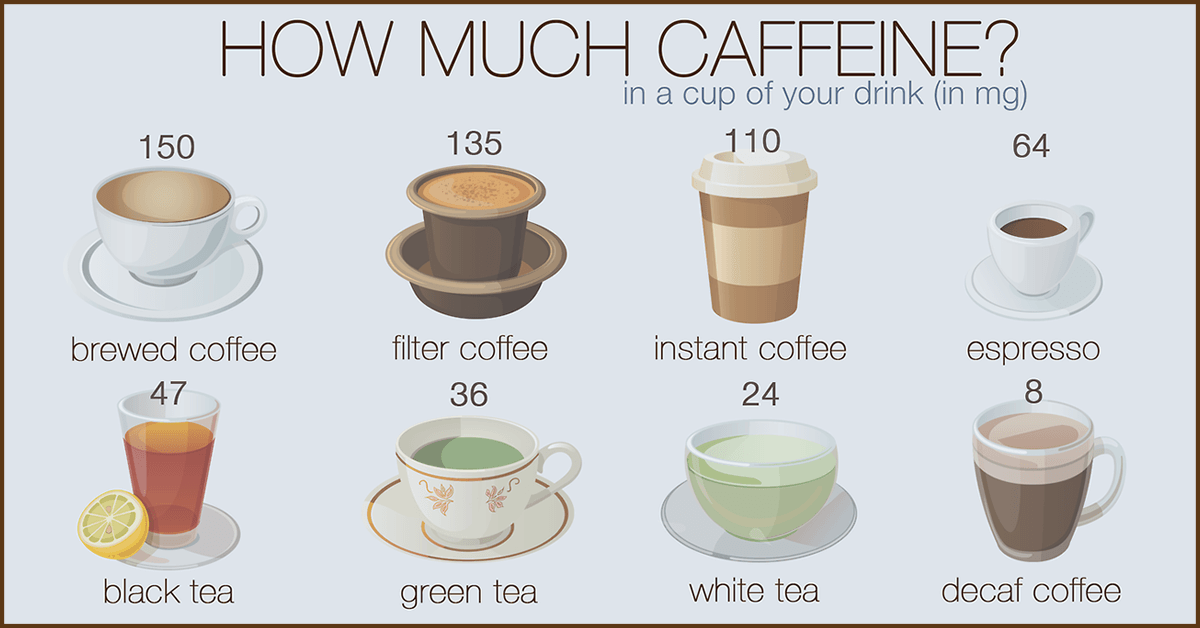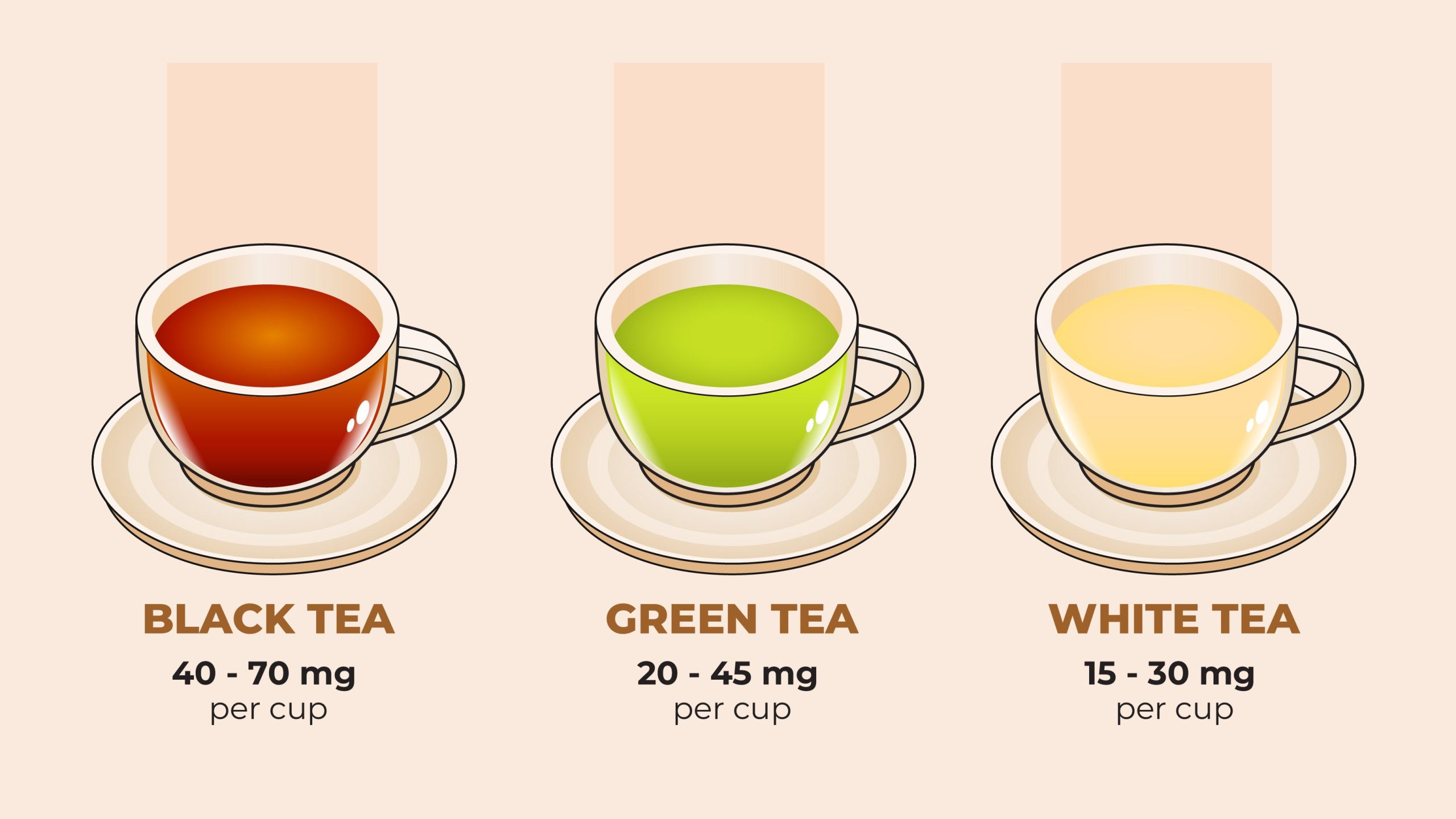As an Amazon Associate I earn from qualifying purchases.
Have you ever wondered how much caffeine is in your morning mug of tea? You’re not alone.
With so many types of tea available, each boasting unique flavors and benefits, it’s natural to be curious about what you’re sipping. Understanding the caffeine content in your tea can help you make informed choices about your daily routine. Whether you’re seeking a gentle boost or aiming to avoid caffeine jitters, this article is here to unravel the mystery for you.
Discover the surprising facts and tips that can make your tea experience even more enjoyable. Keep reading to unlock the secrets of your favorite brew!

Credit: www.bbcgoodfood.com
Caffeine Content In Tea
Tea is one of the most beloved beverages worldwide, offering a comforting ritual and a gentle energy boost. But how much caffeine does your daily mug of tea actually contain? Understanding the caffeine content in tea can help you make informed choices about your consumption, especially if you’re sensitive to caffeine or trying to manage your intake. Let’s dive into the details and find out more about what’s in your cup.
Understanding Caffeine Levels In Different Types Of Tea
Different types of tea contain varying amounts of caffeine. Black tea generally has the highest caffeine content, averaging between 40 to 70 milligrams per cup. Green tea comes next, with around 20 to 45 milligrams per cup. White tea usually contains even less, often falling below 20 milligrams.
Factors like brewing time and water temperature can also impact caffeine levels. A longer brew with hotter water extracts more caffeine, so be mindful of how you prepare your tea.
Comparing Tea To Coffee
You might be wondering how tea compares to coffee in terms of caffeine. A typical cup of coffee contains around 95 milligrams of caffeine, which is significantly higher than most teas. If you’re looking to reduce your caffeine intake, switching from coffee to tea might be a good option.
Consider this: swapping your morning coffee for a mug of black tea could cut your caffeine intake by over half, without sacrificing flavor or ritual. What impact would that have on your energy levels?
Personal Experience With Tea’s Caffeine Impact
I remember the first time I switched from coffee to tea. The change was remarkable; I felt less jittery and more focused throughout the day. It was a refreshing shift, proving that a small change can make a big difference.
If you’re considering reducing your caffeine consumption, tea offers a gentle alternative. It might be just what you need to maintain your energy without the crash.
Tea Varieties And Their Unique Caffeine Profiles
Beyond the standard types of tea, there are numerous varieties with unique caffeine profiles. Matcha, for instance, is a powdered green tea that can contain more caffeine due to its concentrated form. Yerba mate, often grouped with teas, has about 85 milligrams of caffeine per cup.
Exploring these different options can be a fun way to personalize your tea experience. Have you tried different teas to find the caffeine level that suits you best?
Making Informed Choices
Understanding the caffeine content in tea empowers you to make choices that fit your lifestyle. Whether you need a strong energy boost or a calm afternoon sip, there’s a tea to match your needs.
Next time you reach for a cup, take a moment to consider your caffeine goals. How will your choice affect your day?

Credit: dragonflytea.com
Factors Influencing Caffeine Levels
Caffeine levels in tea vary due to several factors. The type of tea leaves, brewing time, and water temperature significantly affect caffeine content. Black tea typically contains more caffeine than green or white tea, offering a stronger boost.
Understanding the caffeine content in your mug of tea can be quite enlightening. It’s not just about the type of tea leaves; several factors come into play. By knowing these, you can tailor your tea experience to match your caffeine preferences. Let’s explore some of these factors that influence caffeine levels in your tea.
Type Of Tea
The type of tea you choose significantly affects caffeine levels. Black tea typically contains more caffeine than green or white tea. For example, a cup of black tea usually has around 40-70 mg of caffeine, while green tea ranges from 20-45 mg. Have you ever noticed how oolong tea offers a unique middle ground? It balances caffeine content with a variety of flavors. So, next time you reach for a tea bag, consider the type and how it aligns with your daily caffeine needs.
Brewing Time
Brewing time is another critical factor. The longer you steep your tea, the more caffeine gets extracted. If you’re like me and enjoy a robust cup of tea in the morning, you might steep it for 5 minutes. This allows for maximum caffeine extraction. But if you’re aiming for a lighter brew in the evening, a quick 2-minute steep might be all you need. How long do you typically brew your tea, and does it match your desired caffeine kick?
Water Temperature
Water temperature also plays a role in caffeine extraction. Higher temperatures typically extract more caffeine. If you brew your tea with boiling water, expect a stronger caffeine presence. On the other hand, cooler water might lead to a milder caffeine experience. Have you ever tried cold brewing? It results in a subtle flavor with less caffeine, perfect for a refreshing afternoon drink. Experimenting with temperature can be a fun way to customize your tea’s caffeine content. By paying attention to these factors, you can better control the caffeine in your tea. Whether you crave a strong morning brew or a gentle afternoon sip, understanding these elements allows for a more personalized tea-drinking experience. What’s your perfect tea-caffeine balance, and how do you achieve it?
Comparing Tea To Other Beverages
Tea is a popular drink worldwide. People enjoy it for its taste and calming effects. But how does it compare in caffeine content to other beverages? Understanding this can help you make better choices about your daily caffeine intake.
Tea Vs Coffee
Coffee is a favorite morning pick-me-up. It typically contains more caffeine than tea. A standard cup of coffee has around 95 milligrams of caffeine. In contrast, a mug of black tea contains about 40-70 milligrams. Green tea has even less, often around 20-45 milligrams. This makes tea a gentler option for those sensitive to caffeine.
Tea Vs Energy Drinks
Energy drinks promise a quick energy boost. They often contain high levels of caffeine. A typical energy drink may have 80-200 milligrams of caffeine per serving. This is much higher than most teas. Drinking tea offers a more moderate caffeine intake. It provides a steady, calming effect without the jitters. Choose tea for a more balanced energy boost.

Credit: medium.com
Health Implications Of Caffeine In Tea
A mug of tea typically contains less caffeine than coffee, offering a gentler energy boost. This moderate caffeine level can enhance alertness without causing jitters. Drinking tea regularly may support heart health and improve mental focus.
Tea is a popular drink worldwide. It contains caffeine, a natural stimulant. Many enjoy tea for its taste and energy boost. But caffeine affects health in several ways. Understanding these effects is important.
Benefits Of Moderate Consumption
Drinking tea in moderation offers benefits. It can increase alertness and focus. Many find it improves mood and reduces fatigue. Tea also contains antioxidants. These help protect cells from damage. Caffeine in tea is less than coffee. This makes it a gentler choice. Some studies suggest tea supports heart health. It may improve metabolism too. Enjoying a cup can be part of a healthy lifestyle.
Potential Risks And Side Effects
Excessive caffeine has downsides. It can cause sleep problems and anxiety. Some people feel jittery or nervous. High intake may lead to headaches or dizziness. Tea may affect iron absorption. This is important for people with low iron. Pregnant women should be cautious too. They should limit caffeine intake. Balance is key with tea. Knowing your limits helps avoid side effects. `
Decaffeinated Tea Options
Exploring decaffeinated tea options helps reduce caffeine intake. A typical mug of tea contains about 20-60 mg of caffeine. Decaf versions offer a milder caffeine experience, making them a perfect choice for evening relaxation.
Decaffeinated tea offers a fantastic alternative for those who enjoy the soothing qualities of tea without the stimulating effects of caffeine. Whether you’re sensitive to caffeine or simply looking to enjoy a calming cup of tea before bed, decaf options have got you covered. Imagine enjoying the rich flavors and delicate aromas of your favorite tea without worrying about a sleepless night.
Decaf Tea Varieties
Decaf teas come in a wide range of flavors and types. You can find decaf versions of popular teas like black, green, and herbal. For green tea lovers, brands like Twinings and Lipton offer decaffeinated options that retain the fresh, grassy notes you love. Black tea enthusiasts can enjoy decaf Earl Grey or English Breakfast without missing the robust flavor. Herbal tea fans can opt for naturally caffeine-free options like chamomile or mint, which are inherently free of caffeine.
How Decaffeination Works
The process of removing caffeine from tea is fascinating and involves several methods. One common approach is the use of carbon dioxide at high pressure, which gently extracts caffeine while preserving the tea’s flavor. Another method involves using water and natural solvents like ethyl acetate to wash away caffeine. This method is often preferred for its ability to maintain the integrity of the tea’s natural taste. Have you ever wondered how much of the original tea flavor is retained after decaffeination? Many tea drinkers find it difficult to tell the difference, especially with high-quality brands that prioritize flavor preservation. But the real question is: would you be able to taste the difference in a blind test? Decaf tea opens up a world of possibilities for those who are caffeine-sensitive or simply want to enjoy a relaxing cup at any time of the day.
Tips For Managing Caffeine Intake
Are you a tea lover trying to balance your caffeine intake? You’re not alone. Many people enjoy the comforting warmth of a tea mug but worry about its caffeine content. Here are some practical tips to help you manage caffeine consumption without giving up your beloved tea.
Choosing The Right Tea
Not all teas are created equal. Some types have more caffeine than others. Green tea, for instance, typically contains less caffeine compared to black tea. If you’re sensitive to caffeine or aiming to reduce your intake, opt for herbal teas like chamomile or peppermint, which are naturally caffeine-free.
Take a moment to explore different tea options. You might be surprised to find a new favorite that’s both delicious and gentle on your nerves. Ever tried rooibos tea? It’s a delightful, caffeine-free choice that offers a rich flavor.
Mindful Consumption Practices
It’s easy to let tea-drinking become a mindless habit. How often do you find yourself brewing tea just because it’s routine? Consider setting limits on how many cups you drink daily. Try a simple tally system or use a smartphone app to track your consumption.
You can also adjust your brewing time. Shorter steeping can result in less caffeine extraction, making your tea milder. Experiment with different brewing durations and notice how it affects your alertness. It’s fascinating how small changes can lead to big differences in how you feel.
Remember, managing caffeine is about listening to your body. How do you feel after that third cup? Are you jittery or calm? Reflecting on your personal experiences can guide you towards better choices.
By exploring these strategies, you can enjoy your tea while keeping your caffeine intake in check. What’s your favorite tea hack to balance caffeine? Your insights could inspire others on their journey to mindful tea drinking.
Frequently Asked Questions
How Much Caffeine Is In A Mug Of Tea?
A standard mug of black tea contains about 40-70 mg of caffeine. Green tea has slightly less, around 20-45 mg. Herbal teas, like chamomile, usually have no caffeine. The exact amount can vary depending on brewing time and tea type.
Is Tea Caffeine Content Higher Than Coffee?
No, tea generally has less caffeine than coffee. A typical mug of coffee contains about 95 mg of caffeine. In comparison, a mug of tea has 40-70 mg. However, caffeine content can vary based on brewing methods and tea type.
Does The Brewing Time Affect Caffeine Levels?
Yes, brewing time affects caffeine levels in tea. Longer brewing times generally increase caffeine content. For less caffeine, steep tea for a shorter time. The type of tea and water temperature also influence caffeine extraction.
Are There Caffeine-free Tea Options?
Yes, herbal teas are typically caffeine-free. Varieties like chamomile, peppermint, and rooibos have no caffeine. Decaffeinated teas are also available, offering reduced caffeine levels. Always check packaging to ensure a tea is caffeine-free or low in caffeine.
Conclusion
Understanding caffeine in tea helps make better drink choices. Tea provides a gentle energy boost. It’s less intense than coffee. This makes it a great option for many. Enjoy your cup of tea mindfully. It can be a calming ritual.
Remember, everyone’s caffeine tolerance varies. Listen to your body. Pay attention to how you feel after drinking tea. With this knowledge, you can enjoy tea to suit your lifestyle. It’s about balance. Savor your tea moments. They bring comfort and warmth.
As an Amazon Associate I earn from qualifying purchases.

Sohel Rana is a seasoned author whose passion for home and kitchen essentials permeates through his writing. Born and raised in a small town nestled amidst lush greenery, Rana’s fascination with the intricacies of domestic life blossomed from an early age. His upbringing in a close-knit family environment instilled in him a deep appreciation for the importance of a well-equipped kitchen and a cozy home

